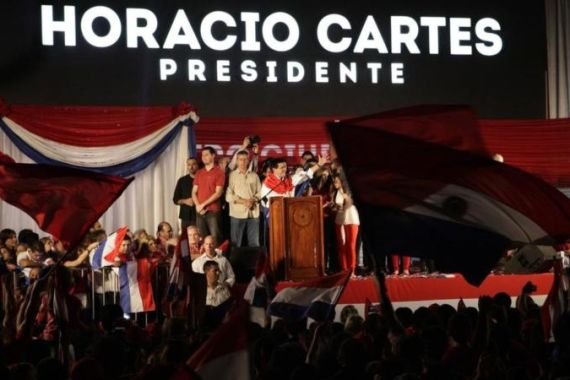Paraguay’s rightward spiral
The “new direction” newly-elected Horacio Cartes has promised for Paraguay is hardly new at all.

Ten months after the 2012 parliamentary coup that overthrew Paraguayan president Fernando Lugo, the South American nation has elected a new leader: Horacio Cartes of the Colorado Party.
Prior to the election of Lugo in 2008, the party ruled the country for 61 consecutive years. At its helm for 35 of these was dictator Alfredo Stroessner.
Cartes’ claims to fame includes an appearance in a 2010 WikiLeaks cable from the United States embassy in Buenos Aires concerning “Operation Heart of Stone”, a project targeting drug trafficking and money laundering outfits in locations such as the Tri Border Area (TBA) between Argentina, Brazil, and Paraguay.
According to the cable, Cartes was the director of “an organization believed to launder large quantities of United States currency generated through illegal means, including through the sale of narcotics, from the TBA to the United States”.
The Curuguaty massacre
The presidency of Cartes’ predecessor Lugo consisted of one opposition attempt after another to dislodge the man.
The desired pretext for a coup finally arrived on June 15, 2012, when a confrontation between Paraguayan police and landless campesinos resulted in the deaths of six members of the former group and 11 members of the latter.
The confrontation occurred as police attempted to remove the campesinos from a sliver of territory in Curuguaty, where businessman and one-time Colorado Party politician Blas Riquelme deemed them to be in violation of his personal lebensraum.
To be sure, land rights are a touchy subject in a country in which eighty percent of arable land belongs to two percent of the population.
According to human rights reports, the police operation in Curuguaty involved extrajudicial assassinations, torture, and arbitrary detentions. The post-massacre judicial process has, however, been decidedly selective.
Mariana Ladaga, a journalist at Paraguay’s La Nación newspaper, recounted to me a phone conversation with Paraguayan prosecutor Jalil Rachid concerning detained campesinos. The word “campesino” was a misnomer, Rachid told her; the proper term was “invader”.
An intriguing glimpse into Rachid’s modus operandi appeared earlier this year on the Yahoo! News website:
The prosecutor says he has no physical evidence showing who killed [the] six police officers… He says he didn’t even try to determine who killed 11 farm workers who also died when the bullets started flying. Even so, Rachid has said he’ll ask a judge… to formally charge 10 peasants who survived the fusillade with attempted homicide, and punish them with up to 25 years in prison.
Neoliberal ecstasy
The first beneficiary of the Curuguaty massacre was Federico Franco, who ascended to the presidency as Lugo’s replacement.
In tragicomically blatant confirmation of some of the real motives behind the coup, the Franco regime promptly presided over the domestic institutionalisation of Monsanto’s Bt cotton and signed a Memorandum of Understanding with transnational mining corporation Rio Tinto Alcan.
|
|
| Cartes declared Paraguay’s new president |
During my recent interview with Franco at the presidential residence in Asunción, he declared the country “ideal for investors” and spoke gleefully of genetically modified organisms and the opportunities for financial betterment these afford to farmers.
Of course, given Bt cotton’s track record and the fact that it has contributed to a situation in India in which nearly 300,000 farmers have committed suicide – many as a result of being driven into debt by the crop – it’s not difficult to see that the corporate elite have superior chances of undergoing GMO-induced financial betterment.
Franco’s neoliberal ecstasy turned to momentary ire when I asked if he detected any similarities between the 2009 coup d’état against Manuel Zelaya in Honduras and last year’s events in Paraguay.
In both cases, right-wing putschists claimed that their respective coups were not in fact coups but rather manifestations of democracy.
Regressing into the future
As for yesterday’s ostensible manifestation of democracy in the Paraguayan elections, the triumph of the ultra-right in what was merely a contest between two ultra-right candidates alludes to another common denominator between Paraguay and Honduras.
Both heads of state were disposed of for allegedly being overly leftist when, in reality, the policies of Zelaya and Lugo constituted relatively minor challenges to entrenched power.
It appears that, in the lexicon of the Latin American elite, “leftism” has come to signify anything less than rabidly right-wing.
As José Tomás Sánchez, a former minister under Lugo, put it to me: “The real threat that Lugo posed to the Paraguayan oligarchy was not socialism but simply better democracy”.
Anti-democratic regression has now been validated via the ever-handy staging of elections – “staging” being the operative word in light of rampant reports of vote-buying.
The ultimate effect of the 2012 coup – the very occurrence of which has been effectively purged from history – is a constriction of the political spectrum that impedes an amelioration of the circumstances of the non-elite majority.
In other words, the “new direction” Cartes has promised for Paraguay is hardly new at all.
Belen Fernandez is the author of The Imperial Messenger: Thomas Friedman at Work, released by Verso in 2011. She is a member of the Jacobin Magazine editorial board, and her articles have appeared in the London Review of Books blog, The Baffler, Al Akhbar English and many other publications.
